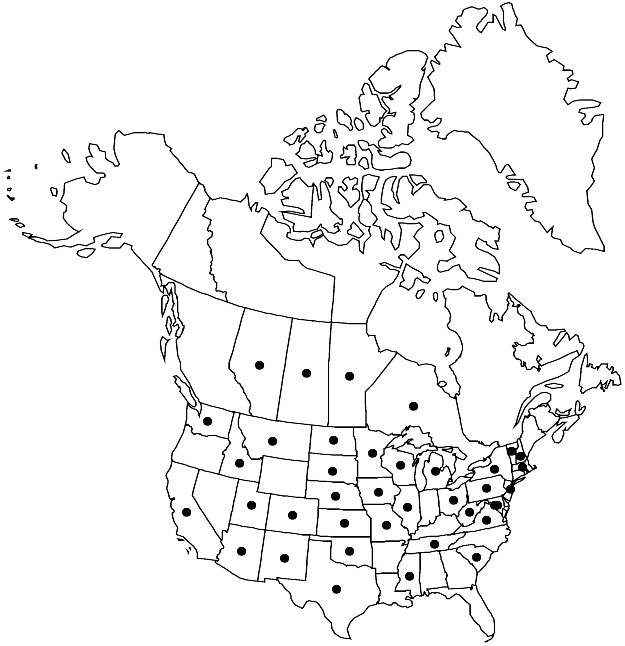Difference between revisions of "Orthotrichum pumilum"
Monthly Rev. 34: 538. 1801.
FNA>Volume Importer |
FNA>Volume Importer |
(No difference)
| |
Revision as of 19:48, 24 September 2019
Plants to 0.5 cm. Stem leaves stiff, loosely erect-appressed when dry, ovate-lanceolate to lanceolate, 1.8–2.8 mm; margins revolute nearly to apex, entire; apex sharply to slenderly acute, usually apiculate, rarely obtuse, not carinate, not incurved when dry; basal laminal cells rectangular, grading to quadrate at margin, walls thin, not nodose; distal cells 14–20 µm, 1-stratose, lumina smooth, rounded, smooth or papillae 1 or 2 per cell, conic, small. Specialized asexual reproduction occasional, by gemmae on leaves. Sexual condition autoicous. Vaginula with hairs absent. Seta to 0.5 mm. Capsule immersed to 3/4 emergent, oblong to oblong-cylindric, 1.2–1.5 mm, strongly 8-ribbed, sometimes constricted below mouth when dry; stomata immersed, mid capsule, not or to 1/2 covered by subsidiary cells, cells projecting or not, inner walls thickened or not; peristome double; prostome absent; exostome teeth 8, rarely splitting to 16, reflexed, finely and evenly papillose; endostome segments 8, not well developed, of 1 or 2 rows of cells, smooth. Calyptra oblong, smooth, sparsely hairy or rarely naked, hairs smooth. Spores 14–21 µm.
Habitat: Trunks, lower branches, base of deciduous trees, coniferous trees, crevices of rock, open, hardwood forests, trees along roadsides
Elevation: low to moderate elevations (10-1000 m)
Distribution

Alta., Man., Ont., Sask., Ariz., Calif., Colo., D.C., Idaho, Ill., Iowa, Kans., Md., Mass., Mich., Minn., Miss., Mo., Mont., Nebr., N.H., N.J., N.Mex., N.Y., N.Dak., Ohio, Okla., Pa., S.C., S.Dak., Tenn., Tex., Utah, Vt., Va., Wash., W.Va., Wis., Europe, n Africa.
Discussion
Orthotrichum pumilum usually can be distinguished by the strongly ribbed capsules, reflexed peristome teeth, apiculate leaves with cells larger than 14 µm, and papillae that are very small or absent. In eastern North America, this taxon is uniform and non-variable, but in the West it is much more variable. Many western specimens have capsules that are oblong-cylindric, often strangulate, over 1/2 emergent, and gradually contracted to the seta.
Selected References
None.